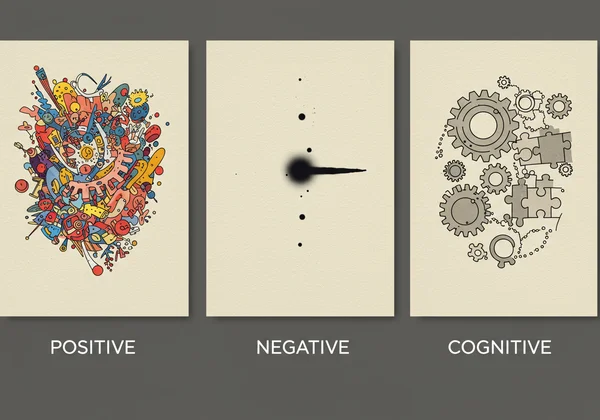การทดสอบโรคจิตเภท: สัญญาณเตือนเริ่มต้นที่ควรสังเกต
รู้สึกสับสนหรือกังวลเกี่ยวกับการเปลี่ยนแปลงในความคิดหรือพฤติกรรมของคุณหรือไม่? คุณอาจกำลังมองหา ** การทดสอบโรคจิตเภท ** หรือมองหา ** การประเมินเบื้องต้น ** การทำความเข้าใจ ** สัญญาณเตือนเบื้องต้นของโรคจิตเภท ** สามารถเป็นก้าวแรกสู่ความชัดเจนและการได้รับความช่วยเหลือที่คุณต้องการ คู่มือนี้จะช่วยให้คุณรับรู้ถึงสัญญาณที่ละเอียดอ่อนและสนับสนุนให้คุณก้าวไปสู่การทำความเข้าใจประสบการณ์ของคุณ เครื่องมือฟรีและเป็นความลับของเราที่ Schizophreniatest.net นำเสนอข้อมูลเบื้องต้นเพื่อช่วยให้คุณตัดสินใจว่าการปรึกษาผู้เชี่ยวชาญเหมาะสมกับคุณหรือไม่

ทำความเข้าใจอาการหลักของโรคจิตเภท
โรคจิตเภทเป็นภาวะสุขภาพจิตที่ซับซ้อนซึ่งส่งผลต่อวิธีที่บุคคลคิด รู้สึก และประพฤติตน การรับรู้ถึง ** อาการของโรคจิตเภท ** เป็นสิ่งสำคัญสำหรับการแทรกแซงตั้งแต่เนิ่นๆ อาการเหล่านี้มักแบ่งออกเป็นประเภทบวก ลบ และด้านการรู้คิด โดยแต่ละประเภทส่งผลกระทบต่อชีวิตประจำวันแตกต่างกัน การทราบว่าจะสังเกตอะไรสามารถช่วยให้คุณหรือคนที่คุณรักได้รับการสนับสนุนอย่างทันท่วงที

อาการด้านบวก: เมื่อความเป็นจริงเปลี่ยนไป
"อาการด้านบวก" หมายถึงประสบการณ์ที่ถูก * เพิ่มเข้ามา * ในความเป็นจริงของบุคคล ไม่จำเป็นต้องเป็นสิ่งที่ดีเสมอไป พวกเขามักเป็นสัญญาณที่สังเกตเห็นได้ชัดเจน ตัวอย่างที่พบบ่อยคือ ** อาการประสาทหลอน ** ซึ่งเกี่ยวข้องกับการมองเห็น ได้ยิน ดมกลิ่น ลิ้มรส หรือสัมผัสสิ่งที่ไม่เป็นจริง อาการประสาทหลอนทางการได้ยิน เช่น การได้ยินเสียง เป็นอาการที่พบบ่อยเป็นพิเศษ อาการด้านบวกที่สำคัญอีกประการหนึ่งคือ ** อาการหลงผิด ** ซึ่งเป็นความเชื่อที่เข้มแข็ง ผิดพลาด ไม่ได้อิงกับความเป็นจริง และต่อต้านหลักฐานที่ขัดแย้ง ตัวอย่างเช่น บุคคลอาจเชื่อว่าตนเองกำลังถูกจับตามอง หรือคนอื่นกำลังพยายามทำร้ายตนเอง (มักเกี่ยวข้องกับความกังวลเกี่ยวกับ ** โรคจิตเภทชนิดหวาดระแวง ** ) ** ความคิดและภาษาที่ผิดปกติ ** ซึ่งบุคคลนั้นจะพูดเปลี่ยนหัวข้อไปมา หรือพูดในลักษณะที่ติดตามได้ยาก ก็จัดอยู่ในหมวดหมู่นี้เช่นกัน การเปลี่ยนแปลงของความเป็นจริงเหล่านี้อาจทำให้น่าอึดอัดใจและจัดการได้ยาก เน้นย้ำถึงความต้องการความเข้าใจและการสนับสนุน
อาการด้านลบ: การลดลงของการทำงานปกติ
ตรงกันข้ามกับอาการด้านบวก "อาการด้านลบ" หมายถึงการขาดหายไปหรือการลดลงของหน้าที่ปกติ อาการเหล่านี้มักถูกเข้าใจผิดว่าเป็นภาวะซึมเศร้าหรือการขาดแรงจูงใจ ทำให้ตรวจจับได้ยากขึ้น ** ภาวะเฉยเมย ** หรือการขาดความสนใจหรือความกระตือรือร้นในชีวิต เป็นอาการด้านลบที่พบบ่อย สิ่งนี้อาจแสดงออกในลักษณะของการไม่ใส่ใจสุขอนามัยส่วนบุคคลหรือกิจกรรมประจำวัน ** การถอนตัวทางสังคม ** เป็นสัญญาณสำคัญอีกประการหนึ่ง ซึ่งบุคคลอาจแยกตัวออกจากเพื่อนและครอบครัว สูญเสียความสนใจในการปฏิสัมพันธ์ทางสังคม การแสดงออกทางอารมณ์ที่ราบเรียบ หรือช่วงของอารมณ์ที่ลดลงก็สังเกตได้เช่นกัน บุคคลนั้นอาจพูดด้วยน้ำเสียงราบเรียบ แสดงสีหน้าเพียงเล็กน้อย หรือมีปัญหาในการรู้สึกถึงความสุข อาการเหล่านี้อาจส่งผลกระทบร้ายแรงต่อความสามารถของบุคคลในการใช้ชีวิตประจำวันและรักษาความสัมพันธ์
อาการด้านการรู้คิด: ผลกระทบต่อการคิด
** อาการด้านการรู้คิด ** ส่งผลต่อความจำ สมาธิ และการทำงานของสมองส่วนหน้า ซึ่งเป็นความสามารถที่ช่วยให้เราวางแผน จัดระเบียบ และแก้ไขปัญหา อาการเหล่านี้อาจละเอียดอ่อน แต่ส่งผลกระทบอย่างมากต่อความสามารถของบุคคลในการเรียนรู้และทำงาน ตัวอย่างได้แก่ ความยากลำบากในการทำความเข้าใจข้อมูล การมีปัญหาในการจดจ่อหรือมีสมาธิ และความท้าทายกับความจำใช้งาน (ความสามารถในการใช้ข้อมูลทันทีหลังจากเรียนรู้) ปัญหาเหล่านี้อาจทำให้ติดตามบทสนทนาได้ยาก จดจำนัดหมายได้ลำบาก หรือทำงานให้สำเร็จได้อย่างมีประสิทธิภาพ การรับรู้ถึงการเปลี่ยนแปลงด้านการรู้คิดเหล่านี้เป็นสิ่งสำคัญอย่างยิ่ง โดยเฉพาะอย่างยิ่งเมื่อพิจารณาถึง ** การทดสอบประเมินโรคจิตเภท ** ที่ครอบคลุม
โรคจิตเภทมักเริ่มต้นขึ้นอย่างไร
การเริ่มต้นของโรคจิตเภทไม่ค่อยเกิดขึ้นอย่างฉับพลัน มักจะค่อยๆ พัฒนาไปตามกาลเวลา การทำความเข้าใจ ** โรคจิตเภทเริ่มต้นขึ้นอย่างไร ** สามารถช่วยให้บุคคลและคนที่พวกเขารักรับรู้ถึงสัญญาณบ่งชี้เบื้องต้นที่สุด ช่วงเวลานี้เรียกว่า ** ระยะโปรโดรมัล ** ซึ่งเป็นช่วงที่การเปลี่ยนแปลงที่ละเอียดอ่อนเริ่มปรากฏขึ้นก่อนที่จะมีอาการที่ชัดเจนมากขึ้น
ระยะโปรโดรมัล: การเปลี่ยนแปลงที่ละเอียดอ่อนก่อนการเริ่มต้น
** ระยะโปรโดรมัล ** เป็นช่วงเวลาสำคัญที่สามารถสังเกตเห็นการเปลี่ยนแปลงที่ละเอียดอ่อนและไม่เฉพาะเจาะจง การเปลี่ยนแปลงเหล่านี้มักเกิดขึ้นก่อนการเริ่มต้นเต็มรูปแบบของโรคจิตเภทหลายเดือนหรือหลายปี ในช่วงเวลานี้ บุคคลนั้นอาจประสบกับประสิทธิภาพการเรียนหรือการทำงานที่ลดลง การถอนตัวทางสังคม พฤติกรรมหรือความคิดที่ผิดปกติซึ่งยังไม่ถึงขั้นหลงผิดหรือประสาทหลอนอย่างเต็มที่ และการสูญเสียความสนใจในกิจกรรมที่เคยชอบไปโดยทั่วไป พวกเขาอาจมีการเปลี่ยนแปลงทางอารมณ์ กลายเป็นคนหงุดหงิดหรือวิตกกังวลมากขึ้น ในช่วงระยะเวลานี้เองที่หลายคนหรือครอบครัวอาจเริ่มค้นหาคำตอบ อาจสงสัยว่า "** ฉันจะบอกได้อย่างไรว่าฉันเป็นโรคจิตเภท? **" หรือมองหา ** การทดสอบโรคจิตเภทฟรี ** การรับรู้ถึงสัญญาณเริ่มต้นที่มักจะสับสนเหล่านี้เป็นกุญแจสำคัญในการดำเนินการอย่างทันท่วงที

การเปลี่ยนแปลงที่ค่อยเป็นค่อยไปเทียบกับการเริ่มต้นอย่างฉับพลัน
แม้ว่าบางกรณีอาจดูเหมือนเกิดขึ้นอย่างฉับพลัน แต่การดำเนินไปของโรคจิตเภทมักเป็นกระบวนการที่ค่อยเป็นค่อยไป บุคคลนั้นอาจค่อยๆ ถอนตัวออกจากสถานการณ์ทางสังคม ความคิดของพวกเขาอาจสับสนมากขึ้น หรือพวกเขาอาจพัฒนาความเชื่อที่แปลกไปตามกาลเวลา ความก้าวหน้าที่ช้าลงนี้อาจทำให้ยากต่อการระบุจุดเริ่มต้นที่แน่นอนของโรค อย่างไรก็ตาม ในบางกรณีที่เกิดขึ้นไม่บ่อยนัก การเริ่มต้นอาจเฉียบพลันมากขึ้น โดยมีอาการปรากฏขึ้นอย่างรวดเร็ว มักมีสิ่งกระตุ้นจากเหตุการณ์ที่ตึงเครียด ไม่ว่าความเร็วของการเริ่มต้นจะเป็นเช่นไร สิ่งที่สอดคล้องกันคือการเปลี่ยนแปลงจากวิธีการคิด ความรู้สึก และการประพฤติตนตามปกติของบุคคล หากคุณกังวลเกี่ยวกับการเปลี่ยนแปลงที่ฉับพลันหรือค่อยเป็นค่อยไปในตัวคุณหรือคนที่คุณรัก การประเมินตนเองเบื้องต้น เช่น เครื่องมือประเมินตนเองของเรา สามารถให้ข้อมูลเชิงลึกเบื้องต้นที่มีคุณค่า
การรับรู้สัญญาณของโรคจิตเภทในระยะเริ่มต้น
เป็นเรื่องปกติที่จะสงสัยว่า "** โรคจิตเภทในระยะเริ่มต้น ** เป็นอย่างไร?" หรืออาการสามารถพิจารณาว่าเป็น "ระดับน้อย" ได้จริงหรือไม่ แม้ว่าโรคจิตเภทจะเป็นภาวะที่ร้ายแรง แต่การแสดงออกอาจแตกต่างกันไปอย่างมาก โดยเฉพาะอย่างยิ่งในระยะเริ่มต้น การรับรู้ถึงสัญญาณที่รุนแรงน้อยลงหรือสัญญาณเริ่มต้นเหล่านี้เป็นสิ่งสำคัญอย่างยิ่ง
สัญญาณระดับน้อยอาจมีลักษณะอย่างไร
** สัญญาณของโรคจิตเภทในระยะเริ่มต้น ** มักมีลักษณะคล้ายกับอาการของภาวะอื่นๆ เช่น ภาวะซึมเศร้าหรือความวิตกกังวล ทำให้ตรวจจับได้ยาก สัญญาณเหล่านี้อาจรวมถึง:
- การเปลี่ยนแปลงบุคลิกภาพหรือพฤติกรรมที่ละเอียดอ่อน
- การแยกตัวทางสังคมมากขึ้น หรือการถอนตัวจากเพื่อน
- ความยากลำบากในการจดจ่อ หรือประสิทธิภาพการเรียนหรือการทำงานลดลงอย่างเห็นได้ชัด
- ความเชื่อที่ผิดปกติหรือไม่ธรรมดา ซึ่งยังไม่ถึงขั้นหลงผิด
- ความไวที่เพิ่มขึ้นต่อเสียง แสง หรือสิ่งกระตุ้นอื่นๆ
- ความรู้สึกไม่สบายใจ ความสงสัย หรือความหวาดระแวงทั่วไป โดยไม่มีสาเหตุที่ชัดเจน
- การเปลี่ยนแปลงรูปแบบการนอนหลับหรือความอยากอาหาร
สำหรับผู้ปกครองหรือผู้ดูแลที่กังวล การสังเกตการเปลี่ยนแปลงที่ละเอียดอ่อนเหล่านี้ในพฤติกรรมของเด็กหรือวัยรุ่น ซึ่งบางครั้งเรียกว่าข้อกังวลเกี่ยวกับ ** การทดสอบโรคจิตเภทในเด็ก ** หรือ ** การทดสอบโรคจิตเภทในวัยรุ่น ** อาจมีความสำคัญอย่างยิ่ง สัญญาณระดับน้อยเหล่านี้ แม้จะไม่ใช่ข้อสรุปที่แน่นอน แต่สามารถเป็นตัวบ่งชี้ที่มีคุณค่าว่าควรมีการสำรวจเพิ่มเติม
ทำไมการรับรู้ตั้งแต่เนิ่นๆ จึงมีความสำคัญ
การรับรู้ถึง ** อาการของโรคจิตเภท ** ตั้งแต่เนิ่นๆ เป็นสิ่งสำคัญอย่างยิ่ง งานวิจัยชี้ให้เห็นว่าการแทรกแซงตั้งแต่เนิ่นๆ สามารถปรับปรุงผลลัพธ์ระยะยาวสำหรับผู้ที่มีอาการโรคจิตได้อย่างมีนัยสำคัญ การจัดการอาการในระยะเริ่มต้นสามารถลดความรุนแรงและระยะเวลาของการกำเริบ เพิ่มประสิทธิภาพของการรักษา และลดการหยุดชะงักในชีวิตของบุคคลได้ เป็นเรื่องของการให้การสนับสนุนก่อนที่อาการจะฝังรากลึกและจัดการได้ยากขึ้น หากคุณสังเกตเห็นการเปลี่ยนแปลงที่น่ากังวล แม้จะเป็นเพียงเล็กน้อย การดำเนินการเชิงรุกเพื่อทำความเข้าใจถือเป็นสัญญาณของความเข้มแข็งและการดูแลตนเอง เพื่อให้ได้ข้อมูลเบื้องต้นเกี่ยวกับสัญญาณที่อาจเกิดขึ้นเหล่านี้ โปรดพิจารณาเยี่ยมชม ** การทดสอบโรคจิตเภทออนไลน์ ** ฟรีและเป็นความลับของเรา
ทำความเข้าใจสัญญาณเบื้องต้น: ก้าวต่อไปสู่ความชัดเจน
การทำความเข้าใจเกี่ยวกับความกังวลด้านสุขภาพจิตที่เป็นไปได้ โดยเฉพาะอย่างยิ่งเกี่ยวกับโรคจิตเภทที่ซับซ้อน อาจทำให้รู้สึกท่วมท้น การทำความเข้าใจ ** สัญญาณเตือนเบื้องต้นของโรคจิตเภท ** เป็นก้าวแรกที่ทรงพลัง ช่วยให้คุณมีความรู้ที่สามารถนำไปสู่การสนับสนุนอย่างทันท่วงทีและผลลัพธ์ที่ดีขึ้น โปรดจำไว้ว่า การรับรู้ถึงสัญญาณเหล่านี้ไม่ใช่การวินิจฉัยตนเอง แต่เป็นการทำความเข้าใจและเสริมสร้างพลังให้คุณแสวงหาความช่วยเหลือจากผู้เชี่ยวชาญที่เหมาะสม
หากสิ่งใดในคู่มือนี้สอดคล้องกับคุณ หรือหากคุณกำลังประสบกับการเปลี่ยนแปลงที่ทำให้คุณกังวล เราขอแนะนำให้คุณก้าวไปสู่ขั้นตอนต่อไป เครื่องมือออนไลน์ของเรานำเสนอ ** แบบประเมินโรคจิตเภทฟรี ** โดยให้ข้อมูลเชิงลึกเบื้องต้นที่เป็นความลับและทันที โดยอิงจากแบบสอบถามที่มีข้อมูลทางวิทยาศาสตร์ การประเมินตนเองนี้ออกแบบมาเพื่อเป็นจุดเริ่มต้น ช่วยให้คุณจัดระเบียบความคิดและความรู้สึกของคุณก่อนที่จะพูดคุยกับผู้เชี่ยวชาญด้านสุขภาพ

ควบคุมสุขภาพจิตของคุณวันนี้ เยี่ยมชม Schizophreniatest.net เพื่อเริ่มการประเมินตนเองที่เป็นความลับ ความสงบสุขทางใจของคุณมีความสำคัญ และเราพร้อมที่จะสนับสนุนคุณในการก้าวไปสู่ขั้นตอนที่สำคัญในการทำความเข้าใจและแสวงหาความช่วยเหลือ
คำถามที่พบบ่อยเกี่ยวกับสัญญาณเริ่มต้นของโรคจิตเภท
อาการเหล่านี้หมายถึงฉันเป็นโรคจิตเภทหรือไม่?
** อาการเหล่านี้หมายถึงฉันเป็นโรคจิตเภทหรือไม่ **? เป็นเรื่องปกติที่จะรู้สึกกังวลหากคุณรับรู้ถึงอาการบางอย่างที่กล่าวถึง อย่างไรก็ตาม สิ่งสำคัญคือต้องเข้าใจว่ามีเพียงผู้เชี่ยวชาญด้านสุขภาพจิตที่มีคุณสมบัติเท่านั้นที่สามารถวินิจฉัยโรคจิตเภทได้ อาการเหล่านี้หลายอย่างอาจทับซ้อนกับภาวะอื่นๆ เช่น ความวิตกกังวล ภาวะซึมเศร้า หรือแม้แต่ความเครียด ** การทดสอบโรคจิตเภท ** ของเราเป็นเครื่องมือประเมินตนเองเบื้องต้นที่ออกแบบมาเพื่อช่วยให้คุณระบุได้ว่าคุณอาจกำลังประสบกับสัญญาณบ่งชี้เบื้องต้นหรือไม่ กระตุ้นให้คุณพิจารณาการประเมินจากผู้เชี่ยวชาญเพิ่มเติม ไม่ใช่เครื่องมือวินิจฉัย คุณสามารถ เริ่มการประเมินของคุณ เพื่อรับข้อมูลเบื้องต้น
สัญญาณเตือนเบื้องต้นทั่วไปคืออะไร?
** สัญญาณเตือนเบื้องต้นทั่วไปคืออะไร **? สัญญาณเตือนเบื้องต้นมักรวมถึงประสิทธิภาพทางสังคมที่ลดลง การเปลี่ยนแปลงในผลการเรียนหรือการทำงาน ความคิดหรือความเชื่อที่ผิดปกติ ความหงุดหงิดที่เพิ่มขึ้น ความยากลำบากในการนอนหลับ และการขาดแรงจูงใจหรือความสนใจในกิจกรรมต่างๆ โดยทั่วไป การเปลี่ยนแปลงที่ละเอียดอ่อนเหล่านี้ โดยเฉพาะอย่างยิ่งเมื่อเป็นการเปลี่ยนแปลงจากพฤติกรรมปกติของบุคคล มักเป็นสัญญาณบ่งชี้แรกๆ แพลตฟอร์มของเรามีวิธีง่ายๆ ในการตรวจสอบอาการเหล่านี้ คุณสามารถ เริ่มได้เลย
โรคจิตเภทมักเริ่มต้นขึ้นอย่างไร?
** โรคจิตเภทมักเริ่มต้นขึ้นอย่างไร **? โรคจิตเภทมักจะเริ่มต้นอย่างค่อยเป็นค่อยไป บ่อยครั้งในช่วงวัยรุ่นตอนปลายหรือวัยผู้ใหญ่ตอนต้น ด้วยสิ่งที่เรียกว่า ** ระยะโปรโดรมัล ** ในช่วงเวลานี้ อาการจะน้อยและไม่เฉพาะเจาะจง ค่อยๆ พัฒนาจากการเปลี่ยนแปลงที่ละเอียดอ่อนในพฤติกรรมและรูปแบบความคิดไปสู่อาการที่เด่นชัดมากขึ้นตลอดหลายเดือนหรือหลายปี แม้ว่าจะเกิดขึ้นไม่บ่อยนัก แต่บางครั้งก็อาจเกิดขึ้นอย่างรวดเร็ว การทำความเข้าใจการดำเนินไปนี้เป็นกุญแจสำคัญในการรับรู้ตั้งแต่เนิ่นๆ
อาการของโรคจิตเภทสามารถมีระดับน้อยได้หรือไม่?
** อาการของโรคจิตเภทสามารถมีระดับน้อยได้หรือไม่ **? ได้ โดยเฉพาะอย่างยิ่งในระยะเริ่มต้น อาการของโรคจิตเภทอาจมีน้อยและถูกเข้าใจผิดว่าเป็นภาวะอื่นๆ หรือแม้แต่ความกังวลตามปกติของวัยรุ่น สัญญาณระดับน้อยเหล่านี้อาจรวมถึงการแยกตัวทางสังคมที่ละเอียดอ่อน ความเชื่อที่ผิดปกติซึ่งยังไม่ถึงขั้นหลงผิด หรือความยากลำบากในการจดจ่อ การรับรู้ถึงสัญญาณที่รุนแรงน้อยลงเหล่านี้มีความสำคัญพอๆ กับการระบุสัญญาณที่เด่นชัดกว่า เนื่องจากการแทรกแซงตั้งแต่เนิ่นๆ สามารถปรับปรุงผลลัพธ์ได้อย่างมาก หากคุณไม่แน่ใจว่า ** โรคจิตเภทในระยะเริ่มต้น ** มีลักษณะอย่างไร การประเมินตนเองของเราสามารถให้ความชัดเจนได้
ฉันจะทราบได้อย่างไรว่าฉันกำลังเป็นโรคจิตเภท?
** ฉันจะทราบได้อย่างไรว่าฉันกำลังเป็นโรคจิตเภท **? วิธีเดียวที่จะทราบได้อย่างแท้จริงว่าคุณกำลังประสบกับโรคจิตเภทหรือไม่ คือการประเมินอย่างครอบคลุมโดยผู้เชี่ยวชาญด้านสุขภาพจิต เช่น จิตแพทย์หรือนักจิตวิทยา พวกเขาจะทำการประเมินอย่างละเอียด ซึ่งอาจรวมถึงการสัมภาษณ์ การทดสอบทางการแพทย์เพื่อคัดแยกภาวะอื่นๆ และการทบทวนอาการของคุณ ** การทดสอบประเมินโรคจิตเภท ** ของเราสามารถให้แนวทางที่เป็นระบบแก่คุณในการทบทวนประสบการณ์ของคุณและรวบรวมข้อมูลที่เป็นประโยชน์ในการปรึกษาแพทย์ เป็นก้าวแรกที่มีคุณค่าสู่ความชัดเจนและการได้รับความช่วยเหลือที่เหมาะสม